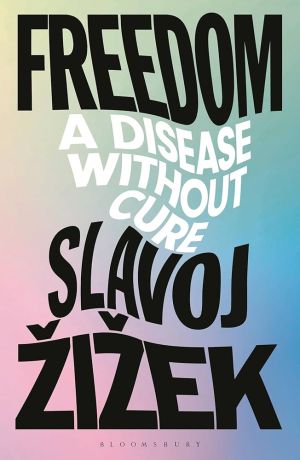Category:Books/Slavoj Zizek/Freedom:A Disease Without Cure
| PDF: | Download #1 | Download #2 | Download #3 |
Page Template:Infobox book/styles.css has no content.
 | |
| Author | Slavoj Žižek |
|---|---|
| Language | English |
| Publisher | Bloomsbury Academic |
Publication date | 2023 |
| Pages | 328 |
| ISBN | Template:ISBNT |
<noautolinks>
About this book
We are all afraid that new dangers pose a threat to our hard-won freedoms, so what deserves attention is precisely the notion of freedom. The concept of freedom is deceptively simple. We think we understand it, but the moment we try and define it we encounter contradictions. In this new philosophical exploration, Slavoj Žižek argues that the experience of true, radical freedom is transient and fragile. Countering the idea of libertarian individualism, Žižek draws on philosophers Hegel, Kierkegaard and Heidegger, as well as the work of Kandinsky and Agatha Christie to examine the many facets of freedom and what we can learn from each of them.
Today, with the latest advances in digital control, our social activity can be controlled and regulated to such a degree that the liberal notion of a free individual becomes obsolete and even meaningless. How will we be obliged to reinvent (or limit) the contours of our freedom?
Tracing its connection to everything from capitalism and war to the state and environmental breakdown, Žižek takes us on an illuminating and entertaining journey that shows how a deeper understanding of freedom can offer hope in dark times.
About the Authors
Gautam Basu Thakur is associate professor of English at Boise State, USA and author of Postcolonial Theory and Avatar (2015) andPostcolonial Lack (2020) and co-editor of Lacan and the Nonhuman (2018).
Jonathan Dickstein is an Independent Scholar of Lacanian psychoanalysis, computer science, and mathematics. He is the co-editor of Lacan and the Nonhuman (2018).
Table of Contents
- Part I: Freedom As Such
- Chapter 1: Freedom and its Discontents
- i) Freedom versus Liberty
- ii) Regulating Violations
- iii) Freedom, Knowledge, Necessity
- iv) Freedom to say NO
- Chapter 2: Is There Such a Thing as Freedom of the Will?
- i) Determinism and its Ragaries
- ii) Rewriting the Past
- iii) Beyond the Transcendental
- iv) Pascalean Wager
- Chapter 3: Indivisible Remainder and the Death of Death
- i) The Standpoint of the Absolute
- ii) The Death of God
- iii) Suicide as a Political Act
- iv)The Failed Negation of Negation
- Appendices I
- 1 Potestas versus Superdeterminism
- 2 Sublation as Dislocation
- 3 Inventing Anna, Inventing Madeleine
- 4 The Political Implications of Non-Representational Art
- Part II: Human Freedom
- Chapter 4: Marx Invented not Only Symptom but Also Drive
- i) Instead of...
- ii) Progress and Apathy
- iii) Dialectical Materialism
- iv) Yes, but...
- v) How Marx Invented Drive
- Chapter 5: The Path to Anarcho-Feudalism
- i) The Blue Pill Called Metaverse
- ii) From Cultural Capitalism to Crypto-Currencies
- iii) Savage Verticality Versus Uncontrollable Horizontality
- Chapter 6: The State and Counter-Revolution
- i) When the Social Link Disintegrates
- ii) The Limit of the Spontaneous Order
- iii) The State is Here to Stay
- iv) Do not give up on your Communist Desire!
- Appendices II
- 5 “Generalized Foreclosure”? No, Thanks!
- 6 Shamelessly Ashamed
- 7 A Muddle Instead of a Movie
- 8 How to Love a Homeland in our Global Era
- Finale: The Four Riders of the Apocalypse
- i) De-Nazifying… Ukraine, Kosovo, Europe
- ii) The End of Nature
- iii) DON'T Be True to Yourself!
- iv) Whose Servant Is a Master?
About the Author
Slavoj Žižek is a Hegelian philosopher, a Lacanian psychoanalyst, and a Communist. He is International Director of the Birkbeck Institute for the Humanities, University of London, UK; Global Distinguished Professor of German at New York University, USA; Professor of Philosophy at The European Graduate School / EGS, Switzerland; and Senior Researcher in the Department of Philosophy at the University of Ljubljana, Slovenia.
Reviews
“Žižek is at heart really a close reader and a seriously inventive one.” ―The Spectator
“Master of the counterintuitive observation.” ―The New Yorker
</noautolinks>
This category currently contains no pages or media.